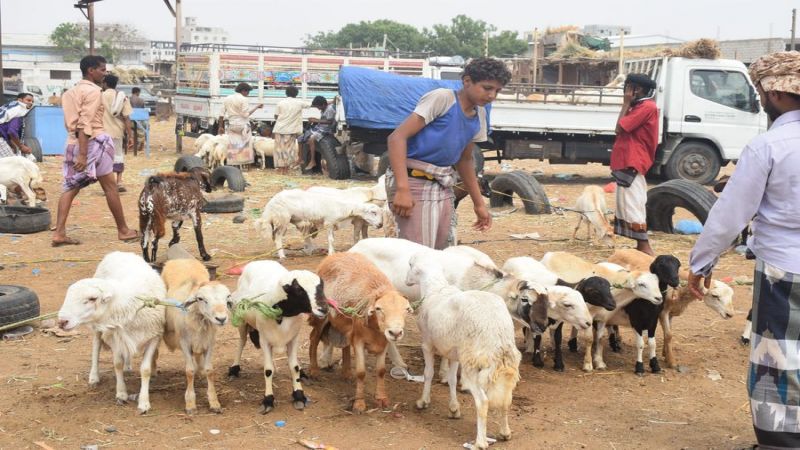
Local Editor
With the advent of Eid al-Adha, Yemenis like other Muslims of the world thronged cattle market in the hope of purchasing sacrificial animals.
The Eid al-Adha, also known as the Feast of the Sacrifice, marks the end of the annual Hajj pilgrimage to Mecca in Saudi Arabia.
But most of the people in the war-ravaged Arab country are complaining about the recent skyrocketing prices of sacrificial animals days ahead of Eid al-Adha festival, which falls on Aug. 11 this year.
Many Yemeni citizens seemed more interested in gawking at thousands of animals available in the market, but cannot afford to buy any due to their high prices.
In the southern port city of Aden, the costs of purchasing a sheep range between 80,000 and 90,000 Yemeni Riyals (137 - 150 U.S. dollars), while prices of big bulls reached unfixed rates around 585,000 (1,000 U.S. dollars) in the cattle markets of the city.
For many poor or average citizens, including Saleh Kassim, who is a displaced Yemeni citizen from the war-torn southern province of Dhalea, purchasing a sheep or a goat turned to be a luxury thing this year.
"Many livestock markets in Aden and neighboring provinces are full of sheep, but people with low income or average families cannot buy because of the high prices," said Kassim.
"People may not be able to perform the tradition of slaughtering sheep during Eid al-Adha this year and turn to buy a few kilos of meat from the butchery," he added.
A number of livestock traders attributed the exorbitant prices of sacrificial animals to blocking of roads as a result of the ongoing fighting in Yemen as well as high fees.
One of the livestock traders told Xinhua that "we face many difficulties in transferring animals from other provinces into Aden or elsewhere as some roads are blocked or filled with landmines."
He pointed out that some traders abandoned buying and selling sacrificial animals this season due to the mounting risks and obstacles of transportation.
"Some traders from Hodeida were unable to transfer their animals out of the province as sporadic fighting there is still taking place in many areas," he added.
Man Yemeni families used to buy animals days ahead of Eid al-Adha to sacrifice during the first day of this annual festival and distribute the meat among the family members, but this year it seems that meat became a luxury in the war-ravaged Arab country.
"This year only families with high incomes can afford to buy sacrificial animals for Eid while other poor families will be without meat," said a Yemeni citizen named as Tahir Mohamed.
The impoverished Arab country has been locked into a civil war in 2014.
Saudi Arabia leads an Arab military coalition that launched a military campaign against Yemen in 2015 to support the resigned regime of former President Abd-Rabbu Mansour Hadi.
The internal military conflict between the Houthis and the Saudi-backed resigned regime of former Yemeni president Abd Rabbu Mansour Hadi has entered its fifth year, aggravating the suffering of Yemenis and deepening the already world's worst humanitarian crisis.
Three-quarters of the entire population, or more than 22 million Yemenis, urgently require humanitarian help, including 8.4 million who struggle to find their next meal.
Source: News Agencies, Edited by Website Team